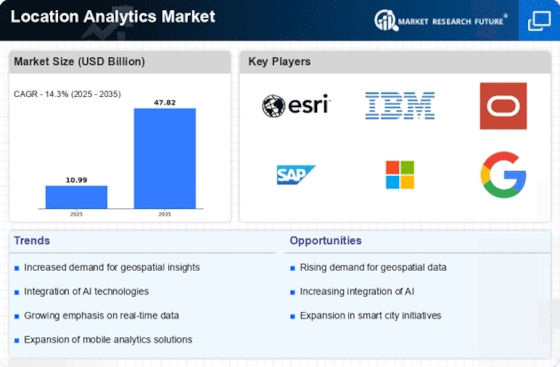Top Industry Leaders in the Location Analytics Market

Competitive Landscape of Location Analytics Market:
The Location Analytics Market is a dynamic and rapidly evolving sector that plays a pivotal role in providing businesses with valuable insights derived from geographic data. The competitive landscape of this market is characterized by the presence of several key players, each employing distinct strategies to gain a competitive edge. As businesses increasingly recognize the importance of location-based insights, the market witnesses a surge in demand, fostering both established and emerging companies.
Key Players:
- TIBCO Software Inc.
- ESRI
- Pitney Bowes
- Oracle Corporation
- SAP SE
- SAS Institute Inc
- Galigeo
- Cisco Systems Inc.
- Alteryx Inc.
- IBM
- Microsoft Corporation
Strategies Adopted:
- Partnerships and Collaborations: Key players often engage in strategic partnerships to expand their offerings. For instance, Google collaborates with various businesses to integrate location-based services into their applications, widening its market reach.
- Product Diversification: Companies continually enhance and diversify their location analytics products to address evolving market needs. Esri, for example, regularly updates its GIS software to incorporate advanced features and accommodate industry-specific requirements.
- Focus on Cloud-Based Solutions: The shift towards cloud-based solutions is evident in the strategies of major players. Microsoft and IBM emphasize the scalability and accessibility of their location analytics services through cloud platforms.
- Customer-Centric Approach: Successful companies in the location analytics market prioritize understanding customer needs. This involves tailoring solutions to meet specific industry requirements, providing customized analytics tools for maximum client satisfaction.
Factors for Market Share Analysis:
- Technological Innovation: The ability to introduce cutting-edge technologies, such as real-time mapping and artificial intelligence integration, contributes significantly to a company's market share. Players investing in R&D to stay ahead in technological advancements have a competitive advantage.
- Global Reach: Companies with a global presence and the capability to provide location analytics services across diverse regions secure a larger market share. Google's ubiquitous mapping services exemplify the importance of a widespread geographic footprint.
- Industry-Specific Expertise: Understanding and catering to the unique needs of specific industries, such as retail, logistics, or healthcare, allows companies to capture market share within niche segments. Esri's success in serving various sectors showcases the significance of industry-specific expertise.
- Data Security and Compliance: In an era of increasing data concerns, companies ensuring robust data security measures and compliance with regulations gain the trust of clients. Compliance with privacy laws and data protection standards is a crucial factor influencing market share.
New and Emerging Companies:
- Carto: Positioned as an emerging player, Carto specializes in location intelligence and spatial analytics. Its innovative approach to data visualization and analysis attracts businesses looking for agile and user-friendly solutions.
- Mapbox: Known for its customizable mapping platform, Mapbox caters to developers and businesses seeking highly interactive and visually appealing maps. Its focus on customization sets it apart in the emerging landscape.
- CARTOGRAM: This startup focuses on indoor location analytics, providing businesses with insights into customer behavior within physical spaces. As the demand for indoor analytics grows, companies like CARTOGRAM are poised for expansion.
- Boundless Spatial: Targeting the open-source GIS market, Boundless Spatial offers cost-effective solutions for geospatial data management and analysis. Its approach appeals to businesses seeking affordable yet powerful location analytics tools.
Current Company Investment Trends:
- Increased R&D Expenditure: Key players allocate substantial resources to research and development, aiming to stay at the forefront of technological innovation. Investments in AI, machine learning, and real-time analytics drive the evolution of location analytics solutions.
- Acquisitions for Portfolio Enhancement: Companies actively pursue acquisitions to augment their service offerings. Strategic acquisitions allow established players to integrate new technologies and expand their market presence. Google's acquisition of Waze is a notable example, enhancing its navigation and traffic analysis capabilities.
- Cloud Infrastructure Investments: Recognizing the scalability and flexibility offered by cloud platforms, companies continue to invest in cloud infrastructure. Microsoft's Azure and IBM Cloud play pivotal roles in delivering location analytics services with enhanced accessibility and performance.
- Global Expansion Initiatives: To tap into emerging markets and diversify their user base, companies are investing in global expansion initiatives. This involves establishing data centers in different regions and tailoring solutions to meet the specific needs of local businesses.










